Down Vs Bamboo Comforter: Choose Your Comfort
When one is deciding between a down and a bamboo comforter, it’s essential to assess your unique sleep needs and preferences. Down comforters are known for their plush warmth, making them perfect for chilly nights, but they might lead to overheating if one is a warm sleeper. On the other hand, bamboo comforters excel in breathability and moisture-wicking, catering to those who tend to sweat at night. As you weigh these factors, consider how they align with your comfort priorities and lifestyle choices, especially in relation to sustainability and care. What will you prioritize in your ideal comforter?
What are the key differences between down and bamboo comforters?
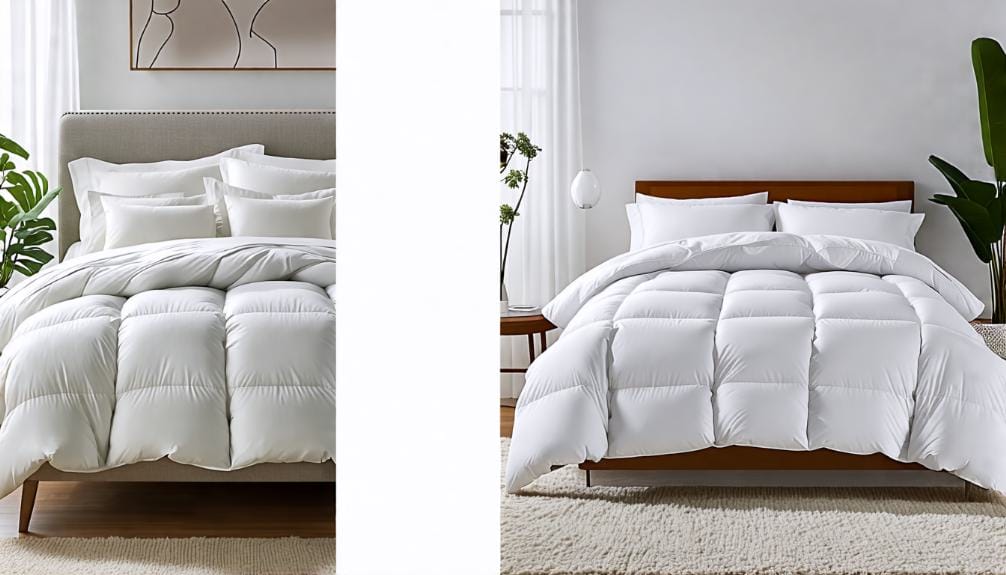
Down and bamboo comforters differ in material, warmth, and breathability.
Down comforters provide luxurious warmth, while bamboo comforters excel at wicking moisture to keep you comfortable all year round.
These differences can help you find the best option for your sleeping needs.
Material composition
Down comforters are crafted from the soft feathers of ducks or geese, while bamboo comforters use fibers from the bamboo plant. This leads to noticeable differences in texture and sustainability.
Down comforters are filled with natural materials, offering luxurious softness and warmth. However, they can attract dust mites and other allergens, which can be a concern for sensitive sleepers.
On the other hand, bamboo comforters are made of bamboo viscose, which is breathable and hypoallergenic. This makes them an excellent choice for people with allergies. Bamboo fibers also wick away moisture, helping to regulate temperature and keep you comfortable in various climates without the excessive heat that down comforters can produce.
Bamboo comforters are generally free from synthetic materials, aligning with eco-friendly practices. Choosing bamboo supports sustainability since bamboo grows quickly and needs fewer resources.
Knowing these material differences can help you decide which comforter suits your needs and values. Whether you prefer the plush feel of down or the eco-conscious nature of bamboo, each option has its unique benefits.
Warmth retention capabilities
Warmth retention is crucial when deciding between down and bamboo comforters, as both materials offer distinct thermal qualities for different sleep preferences.
Down comforters are excellent at retaining heat, making them ideal for those who get cold easily. They trap warmth effectively, providing a cozy and snug feel during chilly nights.
In contrast, bamboo comforters provide balanced temperature regulation. They offer warmth in colder months and help keep you cool in warmer weather, making them a versatile option for year-round use. Additionally, bamboo comforters are hypoallergenic, which is beneficial for those with allergies or sensitivities.
If you tend to sleep hot, a down comforter might make you feel overheated, especially during seasonal changes. Bamboo comforters, with their moisture-wicking and temperature-regulating properties, can help maintain a comfortable sleeping environment.
Your choice will depend on your specific warmth retention needs and sleeping habits. By considering these factors, you can find the perfect comforter that meets your comfort and health requirements.
Breathability and moisture-wicking
Breathability and moisture-wicking are crucial aspects that distinguish bamboo comforters from down comforters, especially for those who struggle with temperature changes during sleep.
While down comforters excel in providing warmth, they often trap heat and moisture, causing discomfort on warmer nights. Bamboo comforters, on the other hand, are great at regulating body temperature, keeping you comfortable throughout the year.
Here are some important differences to consider:
- Breathability: Bamboo offers superior air circulation, helping you stay cool.
- Moisture-wicking: Bamboo efficiently absorbs and evaporates moisture, keeping you dry.
- Temperature regulation: Bamboo keeps a cooler temperature compared to down comforters.
- Hypoallergenic properties: Bamboo is less likely to hold allergens, making it ideal for sensitive sleepers.
Choosing between down and bamboo comforters depends on your sleep preferences.
If you often wake up feeling hot or sweaty, a bamboo comforter is likely your best option. However, if you prefer the plush warmth of down, be prepared for potential overheating on warmer nights.
What are the benefits of down comforters?
If you want a comforter that wraps you in soft warmth, down is a great choice.
It’s excellent for staying warm on cold nights, keeping you cozy and snug.
With a down comforter, you can enjoy a comfortable and luxurious sleep experience.
Luxurious softness
Known for their luxurious softness, down comforters provide an unmatched level of comfort, making bedtime a truly indulgent affair. If you want the perfect mix of coziness and warmth, down comforters are a top pick. Here’s why:
- Incredible Softness: The delicate down feathers offer a plush feel that envelops you in comfort.
- Lightweight Yet Insulating: Down comforters trap heat efficiently without adding bulk, keeping you warm without feeling heavy.
- Durability: With proper care, these comforters can last for years, retaining their luxurious feel.
- Versatility: Suitable for year-round use, they adapt to different seasonal needs.
While down-alternative comforters can imitate this softness, they can’t quite match the authentic feel of real down.
If you value supreme comfort and warmth, investing in a quality down comforter can take your sleep experience to the next level.
Exceptional warmth
Down comforters offer exceptional warmth, making them ideal for cold nights. They trap heat efficiently thanks to their natural down feathers, which provide superior insulation. This makes them a great choice if you often feel cold while sleeping or live in a region with harsh winters.
While down alternative comforters exist, they typically don’t match the warmth of genuine down. If you frequently feel chilly or reside in an area with significant temperature drops in winter, a down comforter can significantly improve your comfort.
It’s also important to consider body temperature regulation. Down comforters excel at retaining warmth, but they can occasionally cause overheating on warmer nights. However, high-quality down’s breathability can help manage this, providing some temperature control.
If sustainability matters to you, be aware that traditional down can raise ethical concerns. Opting for certified down options can help you balance comfort with environmental responsibility.
Insulating properties
Down comforters are known for their insulating properties, making them ideal for cold nights. Here’s why they’re a great choice for staying warm:
- Exceptional warmth retention: Down feathers effectively trap heat, keeping you cozy.
- Lightweight comfort: Despite their warmth, down comforters are lightweight and easy to manage.
- Natural breathability: Down allows for airflow, helping to regulate temperature and prevent overheating.
- Durability: With proper care, down comforters can last for years, retaining their insulating qualities.
While bamboo comforters are great for breathability and moisture-wicking, down comforters excel in providing warmth.
If you often feel cold at night, the superior heat retention of down can significantly improve your comfort during winter.
Think about your personal needs, especially if you tend to get too warm while sleeping.
What are the benefits of bamboo comforters?
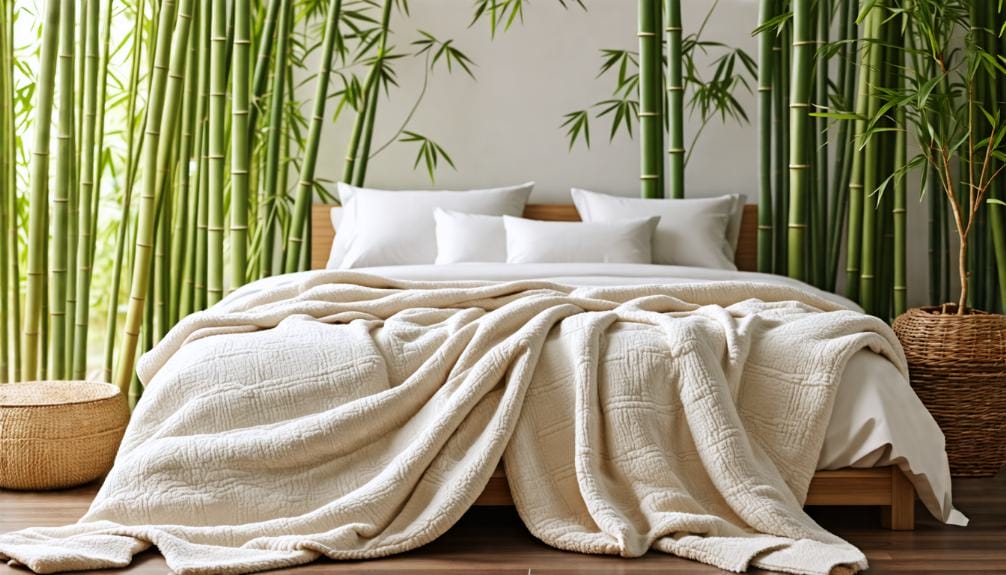
Bamboo comforters offer several benefits that can improve your sleep experience.
They provide excellent breathability and temperature regulation, keeping you comfortable year-round.
Plus, their sustainability and eco-friendliness make them a smart choice for those looking to make environmentally conscious decisions.
Breathability
Breathable bamboo comforters keep you cool and comfortable, making them perfect for those who deal with fluctuating sleep temperatures. Unlike down-alternative bedding, bamboo’s natural properties allow for better airflow. This is especially useful for hot sleepers who find conventional comforters too warm.
Key benefits of bamboo comforters include:
- Moisture-wicking: Bamboo fibers pull moisture away from your body, helping you stay dry and comfortable throughout the night.
- Hypoallergenic: Ideal for people with allergies or sensitive skin, bamboo is less likely to cause irritation.
- Temperature regulation: They help maintain a cooler temperature, making them suitable for all seasons.
- Sustainable: Bamboo is eco-friendly, using fewer resources and chemicals to grow.
With their breathability and comfort, bamboo comforters meet your needs, allowing you to sleep soundly without overheating or irritation. Say goodbye to restless nights and enjoy a more comfortable sleep with bamboo bedding.
Temperature regulation
Bamboo comforters excel at keeping you comfortable in both warm and cool conditions, thanks to their unique ability to regulate temperature. Unlike traditional down alternative comforters that tend to trap heat, bamboo comforters offer superior breathability. This allows air to circulate freely, so you won’t wake up sweating on hot nights. Bamboo can keep your body temperature up to three degrees cooler than down or silk.
The moisture-wicking properties of bamboo are also key to maintaining a comfortable sleep environment. These fibers draw moisture away from your body, keeping you dry and comfortable throughout the night. This is particularly beneficial for those who sleep hot or experience night sweats.
Bamboo comforters are hypoallergenic, making them a smart choice for allergy sufferers. Unlike down, which can harbor allergens like dust mites, bamboo’s natural fibers resist these irritants. This provides a healthier sleep space, free from common allergens.
Sustainability and eco-friendliness
Opting for bamboo comforters supports a healthier sleep environment and promotes sustainability through eco-friendly practices. Bamboo grows quickly and requires fewer pesticides compared to traditional farming methods used for down feathers, making it an excellent choice for those who prioritize sustainable living.
Here are some key benefits of bamboo comforters:
- Rapid Growth: Bamboo can grow up to 3 feet in a single day, making it a highly renewable resource.
- Water Efficiency: Bamboo uses much less water than cotton or other crops, making it an environmentally friendly option.
- Hypoallergenic: Bamboo’s natural properties help reduce allergens, which is great for people with allergies.
- Biodegradable: Unlike synthetic materials, bamboo breaks down naturally, reducing landfill waste.
How do down and bamboo comforters affect sleep quality?
Temperature regulation is key to how down and bamboo comforters affect your sleep quality. If you sleep hot, down might make you feel overheated, while bamboo’s breathability can keep you comfortable year-round.
For those with allergies, bamboo’s hypoallergenic properties can help you sleep more soundly without irritation.
Impact on temperature regulation
Down and bamboo comforters play key roles in temperature regulation, directly impacting sleep quality. Choosing the right one can significantly improve your comfort and help you sleep better. Here’s a practical look at how each type manages temperature:
Down Comforter:
- Excellent for warmth retention.
- Perfect for cold winters but can cause overheating.
Bamboo Comforter:
- Highly breathable with moisture-wicking properties.
- Keeps you cooler in warm weather.
While down provides luxurious warmth, it can be too much for those who experience night sweats. On the other hand, bamboo’s ability to stay cooler can make a big difference if you’re sensitive to heat while sleeping.
This makes bamboo a great choice for a more restful night. Ultimately, your decision between down and bamboo comforters should depend on your personal comfort needs and how well you manage temperature during sleep.
Allergies and sensitivities
Choosing the right comforter is crucial for your sleep quality, especially if you suffer from allergies or sensitivities.
Down comforters are luxurious but can attract dust mites and other allergens. This may worsen allergy symptoms, leading to a stuffy nose or itchy skin and disrupting your sleep.
Bamboo comforters, on the other hand, are hypoallergenic. This means they resist dust mites and mold, creating a healthier sleeping environment. With a bamboo comforter, you can breathe easier and enjoy more restful sleep without worrying about allergens.
If you have sensitivities, a bamboo comforter offers all the warmth and comfort without the allergy risks associated with down products.
Paying attention to your allergies and sensitivities is key to picking the right comforter for a peaceful and uninterrupted night’s sleep.
Overall comfort level
The comfort level of your comforter plays a crucial role in your sleep quality. Down offers plush warmth, while bamboo provides breathable adaptability. Depending on your preferences and sleeping habits, each option has unique advantages.
Consider these key factors:
- Warmth: Down comforters are excellent at trapping heat, making them ideal for colder climates.
- Breathability: Bamboo comforters regulate temperature, keeping you cool on warmer nights.
- Weight: Down comforters feel luxurious and fluffy, whereas bamboo comforters are generally lighter and less bulky.
- Allergen Resistance: Bamboo’s hypoallergenic properties make it suitable for sensitive sleepers, unlike down comforters that can trap allergens.
If you prioritize warmth and a cozy feel, down comforters are a great choice. On the other hand, if breathability and eco-friendly materials are important to you, bamboo comforters might be the better option.
Choosing a comforter that matches your needs can significantly improve your sleep quality, helping you wake up refreshed and ready to tackle the day.
What are the care and maintenance differences?
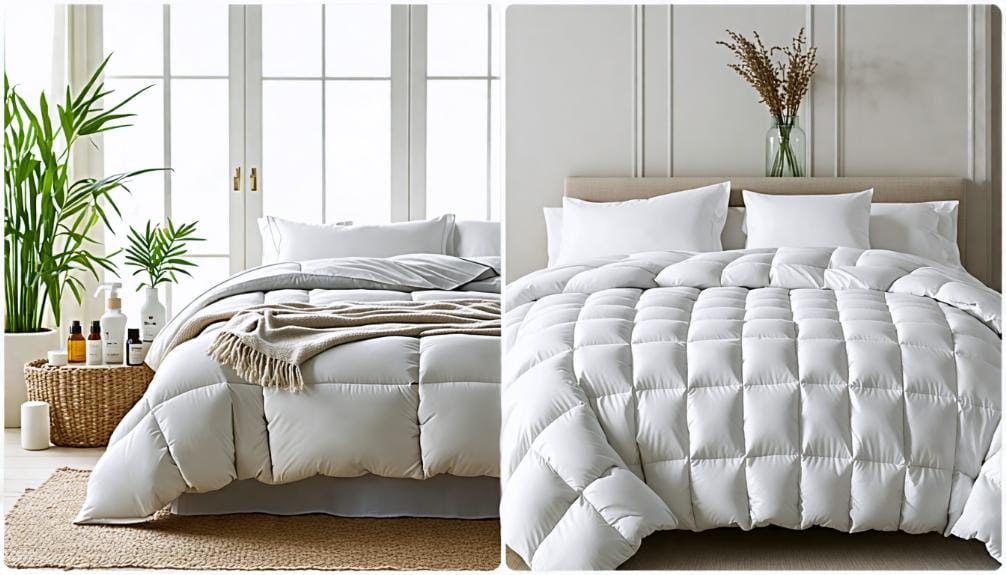
Caring for your comforter varies between down and bamboo options.
Down comforters need special washing and drying techniques to keep their loft and durability.
On the other hand, bamboo comforters are generally easier to clean.
Also, think about how each material handles allergens and dust mites, which can affect your sleep environment.
Washing and drying instructions
Proper care for down and bamboo comforters is essential to keep them in top shape. Here’s a simple guide to washing and drying each type:
Down Comforter:
- Use a front-loading washer to avoid damage.
- Wash on a gentle cycle with mild detergent.
- Dry on low heat and add dryer balls to fluff the down.
- Make sure it’s completely dry to prevent mold and mildew.
Bamboo Comforter:
- Machine wash on a gentle cycle with cold water.
- Use a mild, eco-friendly detergent to protect the fibers.
- Air dry or tumble dry on low heat to keep it breathable.
- Avoid bleach and fabric softeners as they can harm the material.
Durability and lifespan
Taking good care of your comforter is key to making it last. Down and bamboo comforters have different care needs, and knowing these can help you keep them in top shape.
Down comforters are durable but need gentle handling. Use a front-loading washer on a gentle cycle and avoid strong detergents. Drying is crucial; set your dryer to low heat and use dryer balls to keep the filling fluffy and prevent clumping.
Bamboo comforters, on the other hand, are easier to care for. They can usually handle a regular wash cycle and are less likely to get damaged. Bamboo’s moisture-wicking properties help it dry faster, reducing the risk of mold and mildew.
As for lifespan, down comforters can last up to 10 years or more with the right care. Bamboo comforters typically last about 5-7 years, but good maintenance can extend their durability.
Knowing how to properly care for each type will help you pick the comforter that suits your needs and keeps you cozy for years.
Allergens and dust mite concerns
Allergens and dust mites can thrive in environments that aren’t properly cleaned, making regular washing and upkeep crucial for both down and bamboo comforters. Here’s a practical guide to caring for each type:
Washing Frequency: Bamboo comforters should be washed more often since they’re hypoallergenic and repel dust mites. Aim for every 1-2 months.
Cleaning Method: Down comforters need special care; use a front-loading machine or take them to a professional cleaner to avoid damage.
Drying: For down comforters, use low heat and add dryer balls to fluff them up. Bamboo comforters can air dry or tumble dry on low.
Allergen Resistance: Bamboo comforters naturally resist allergens, making them ideal for those with allergies, while down comforters may trap dust mites.
Storage: Store down comforters in breathable bags to prevent moisture buildup. Bamboo comforters can be kept in regular cotton bags.
How do the costs of down and bamboo comforters compare?
Comparing the costs of down and bamboo comforters is crucial.
Down comforters usually carry a higher price, especially the premium ones, while bamboo comforters are generally more affordable.
Consider your budget and comfort needs to make the best choice for you.
Price range of down comforters
Down comforters can vary significantly in price, ranging from a budget-friendly $100 to luxurious options costing over $1,000. Bamboo comforters generally come at a lower cost. It’s essential to consider the factors influencing the price of down comforters to make an informed decision.
Here’s what to look for:
- Quality of Down: Goose down is typically more expensive than duck down because of its superior warmth and softness.
- Fill Power: Higher fill power means better insulation and loft, leading to a higher price tag.
- Brand Reputation: Well-established brands often charge more, reflecting their quality and trustworthiness.
- Construction: Baffle-box construction, which helps distribute heat evenly and increases durability, usually costs more.
Down comforters offer luxurious comfort, but their price can be a sticking point. For a mid-range option, balance your budget with your need for warmth and comfort.
Price range of bamboo comforters
Bamboo comforters are a cost-effective alternative to down comforters, making them a smart choice for shoppers on a budget. Typically, bamboo comforters range from $50 to $150, depending on factors like quality and brand.
On the other hand, down comforters usually start at a higher price, with top-tier options sometimes going over $300.
Bamboo comforters provide a great balance of comfort, quality, and sustainability. They offer a cozy sleep experience without straining your wallet. Plus, bamboo’s eco-friendly properties make it an appealing option for those who prioritize sustainability.
While down comforters are known for their luxury, their high cost can be a barrier. Opting for a bamboo comforter lets you enjoy a comfortable night’s sleep and make a more environmentally responsible choice.
The affordable price of bamboo comforters means you can invest in quality bedding that aligns with your values without compromising on comfort.
Value for money considerations
Down comforters often come with a hefty price tag, making bamboo comforters a more budget-friendly choice that still delivers comfort and quality. Considering value for money, you’ll find bamboo comforters offer a great alternative without compromising performance.
Here’s a quick comparison to think about:
- Price Range: Down comforters can be quite expensive, often exceeding your budget, while bamboo comforters are usually more affordable.
- Longevity: Bamboo comforters tend to last longer, providing better durability and overall value over time.
- Maintenance: Bamboo comforters are easier to care for, typically machine washable, which saves you on dry cleaning costs associated with down.
- Allergy-Friendly: If you’re sensitive to allergens, bamboo’s hypoallergenic properties can save you from spending on allergy medications.
What should you prioritize in your comforter choice?
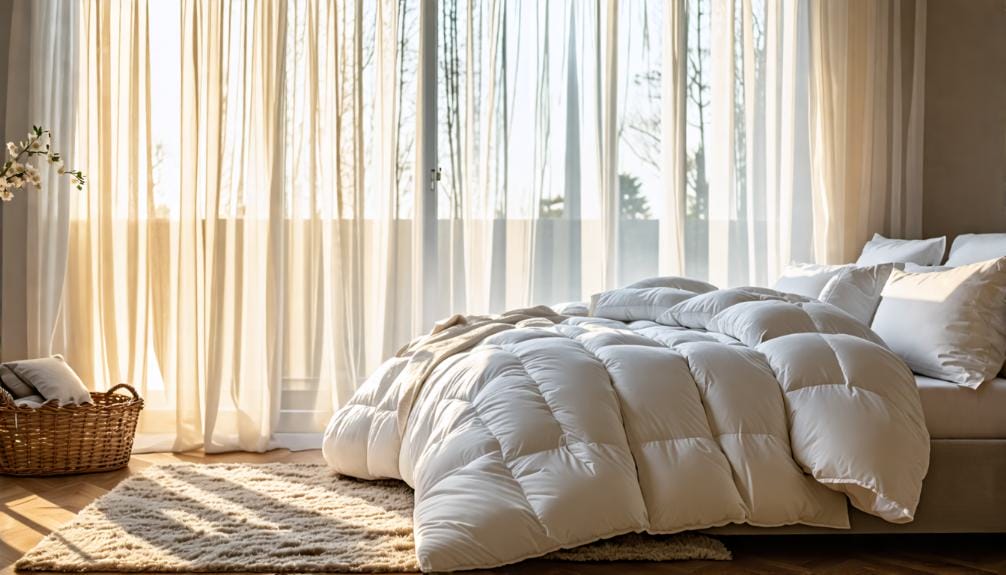
What to Prioritize in Your Comforter Choice
Choosing the right comforter boils down to factors like warmth, breathability, and sustainability that match your sleep preferences and lifestyle. Here’s a quick comparison to help you decide between down and bamboo comforters:
| Factor | Down Comforter | Bamboo Comforter |
|---|---|---|
| Warmth | Top-notch insulation for cold nights | Good warmth; balances temperature well |
| Breathability | Can trap heat, might make you sweat | Highly breathable, wicks moisture away |
| Sustainability | Raises concerns about animal welfare | Eco-friendly; grows fast with minimal pesticides |
| Allergies | Can collect dust mites and allergens | Hypoallergenic, great for sensitive folks |
| Price | Often pricey, varies widely | Generally more affordable |
Warmth: If you’re looking to stay toasty in the winter, down comforters offer superior insulation. They trap heat effectively, making them perfect for colder climates.
Breathability: Overheating can be an issue with down comforters since they can trap heat. Bamboo comforters, on the other hand, are highly breathable and wick away moisture, keeping you cool and dry.
Sustainability: Down comforters often raise concerns regarding animal welfare and the ethics of feather harvesting. Bamboo comforters are more eco-friendly, growing rapidly without the need for a lot of pesticides.
Allergies: Down comforters can harbor dust mites and other allergens, which might be troublesome if you have sensitivities. Bamboo comforters are hypoallergenic, making them a safer bet for those with allergies.
Price: Down comforters can be quite expensive, though prices can vary widely depending on quality and brand. Bamboo comforters generally fall within a more budget-friendly range.
Personal sleep preferences
Grasping your personal sleep preferences is essential for picking the right comforter to meet your needs for comfort and temperature control. Since everyone has different requirements, it’s crucial to consider what works best for you.
Here are key factors to think about in the choice between down and bamboo comforters:
- Warmth retention: Do you need a comforter that keeps you warm all night?
- Breathability: Are you prone to overheating while you sleep?
- Allergies: Do you have sensitivities to specific materials?
- Seasonal use: Will you use the comforter year-round or just in certain seasons?
Your sleep quality can greatly benefit from recognizing these preferences. If you tend to sleep hot, bamboo comforters might be ideal due to their breathability.
On the other hand, if you enjoy the cozy warmth of down comforters and can handle the heat, they might be the best fit for you.
Ultimately, your comfort is what matters most, so choose the option that aligns with your needs for restful sleep.
Ethical considerations regarding materials
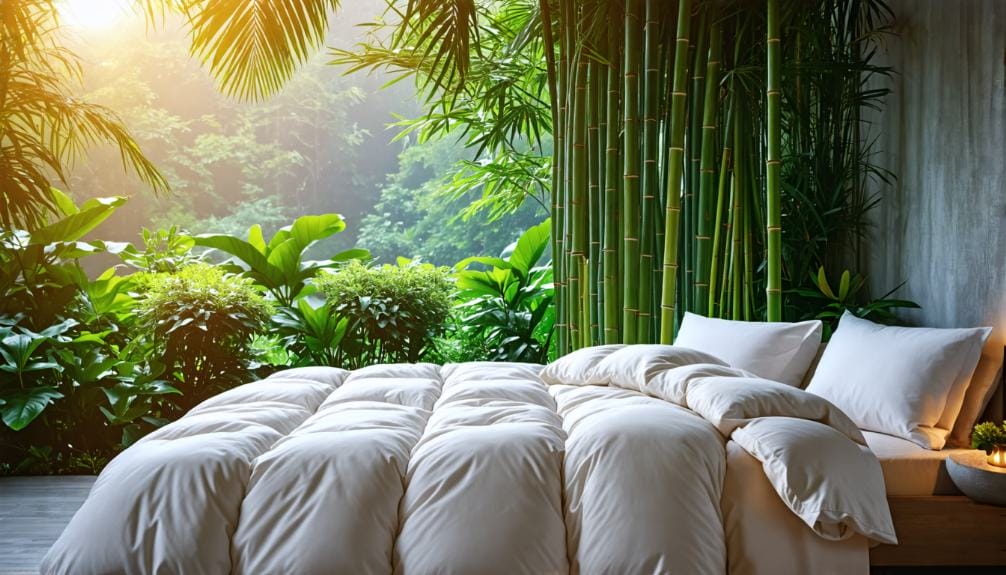
Choosing between down and bamboo comforters involves important ethical considerations that can significantly impact your decision.
Down comforters are known for their luxurious feel and warmth, but they often raise concerns about animal welfare. The sourcing of down can involve practices that some find unethical, leading many to question if their comfort is worth the potential harm to animals.
In contrast, bamboo comforters offer a more sustainable choice. Bamboo grows quickly, needs fewer pesticides, and is generally considered environmentally friendly. This makes bamboo an attractive option for those prioritizing sustainability in their purchases.
For allergy sufferers, bamboo comforters might be the better choice. Bamboo’s hypoallergenic properties help reduce the risk of irritation and are less likely to harbor dust mites compared to down comforters.
Ultimately, the ethical considerations surrounding these materials can significantly influence your comfort choice. Weighing factors like animal welfare, sustainability, and health can help you make a more informed decision that aligns with your values and needs.
Whether you opt for down or bamboo, being mindful of these factors can enhance your overall comfort experience.
Climate and seasonal changes
Navigating climate and seasonal changes with the right comforter can greatly impact your sleep quality. You need a comforter that adapts well to temperature variations throughout the year.
Consider these key points when deciding between down and bamboo options:
- Warmth Retention: Down comforters are great for providing cozy warmth during the colder months.
- Breathability: Bamboo comforters excel in breathability, keeping you cool in hotter weather.
- Moisture-Wicking: Bamboo wicks away moisture, which helps manage sweat and ensures a comfortable night’s sleep.
- Weight: Down can feel heavier and may trap heat, while bamboo is lighter and more adaptable to seasonal changes.
If you frequently face fluctuating seasonal temperatures, bamboo’s ability to keep you comfortable in both warm and cold conditions makes it a smart choice.
On the other hand, if you love the enveloping warmth of down, be prepared for the possibility of overheating during changing seasons.
Your comfort should always align with your unique sleep needs.
Frequently Asked Questions
Are Down Comforters Suitable for People With Allergies?
Down comforters aren’t ideal for allergy sufferers. They can trap dust mites and other allergens, potentially worsening your symptoms. If allergies are a concern for you, consider hypoallergenic alternatives like bamboo for a better night’s sleep.
How Do Bamboo Comforters Handle Moisture Absorption Over Time?
Bamboo comforters excel at moisture absorption, wicking away sweat and keeping you dry throughout the night. They stay fresh longer, reducing odors and promoting a comfortable sleep environment, making them ideal for those prone to night sweats.
Can Down Comforters Be Machine Washed Easily?
Yes, down comforters can be machine washed, but you should use a front-loading washer on a gentle cycle with cold water. Make sure to add dryer balls to maintain fluffiness while drying.
Do Bamboo Comforters Have Any Odor Issues?
Bamboo comforters typically don’t have odor issues, thanks to their natural breathability and moisture-wicking properties. If you notice any smell, it’s usually from storage or packaging, and airing it out should resolve that.
What Is the Lifespan of Down Versus Bamboo Comforters?
When considering lifespan, down comforters typically last 10-15 years with proper care, while bamboo comforters can last about 5-10 years. Regular maintenance can extend both, but you’ll find down generally offers more durability.
In Conclusion
Ultimately, choosing between a down and bamboo comforter comes down to your personal preferences and needs.
If you crave luxurious warmth and softness, a down comforter might be your best bet.
However, if you prioritize breathability and hypoallergenic features, a bamboo comforter could be the perfect fit.
Consider your sleep environment, allergies, and commitment to sustainability when making your decision.
Whichever you choose, guarantee it aligns with what makes you feel most comfortable at night.
